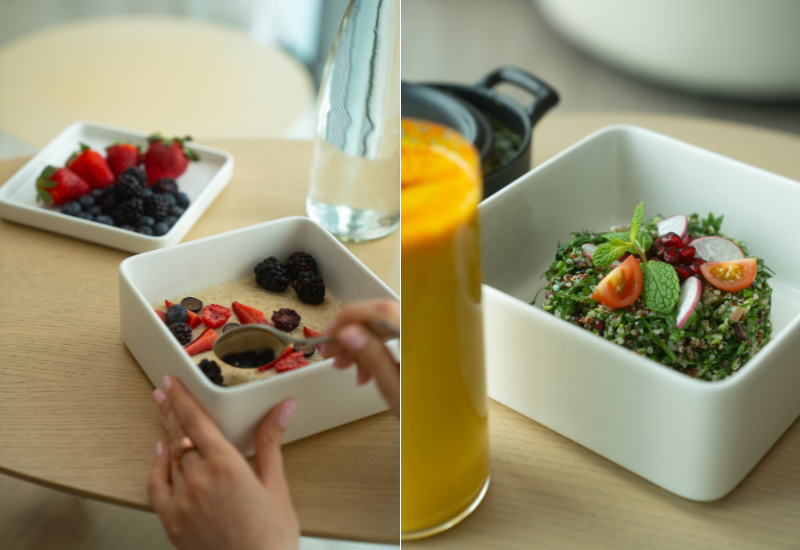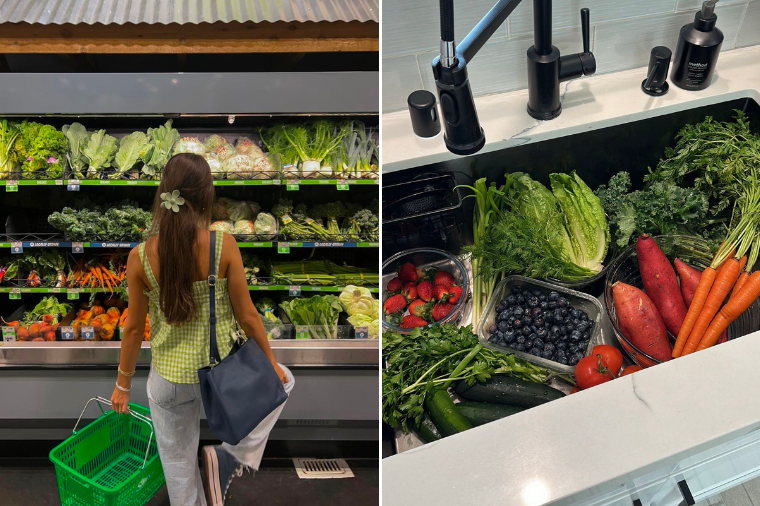SIRO One Za’abeel’s in-house nutritionist, Heeral Shivnani, shares her top tips for gut health prep for summer travel.
Talk us through your background.
I am a clinical dietitian specialising in gut health and hormonal imbalances, helping clients uncover the root causes of symptoms like bloating, irregular bowel syndrome (IBS), irregular menstrual cycles, and stubborn weight gain. With a science-backed yet holistic approach, I blend functional nutrition with lifestyle strategies to restore balance, improve digestion, and support long-term wellness. My practice focuses on empowering individuals to understand their bodies better and make sustainable changes that truly transform how they feel day-to-day.
What are some of the tips to keep your gut health during summer, especially when travelling?
Summer travel often means changes in routine, diet, and hydration – each of which can impact your gut. To support digestive health on the go, stay hydrated, especially in hotter climates, as water helps keep digestion smooth and prevents constipation. Place emphasis on room temperature and warm beverages, such as herbal teas. Eat fermented foods like yogurt, kefir, kanji, sourdough bread, or pickled vegetables whenever possible – they naturally replenish beneficial bacteria. Pack a travel-friendly probiotic, especially if you’re exploring new cuisines or regions where food hygiene might vary, and you may or may not have access to the above. Maintain regular mealtimes to avoid overeating at night and disrupting your gut’s circadian rhythm. Choose fibre-rich snacks like roasted chickpeas, or trail mixes with roasted seeds and dried fruit such as figs, raisins and dates to keep your microbiome fed while in transit. You’ve mentioned the benefits of intermittent fasting.
How does this practice support gut health?
Intermittent fasting can give the digestive system a much-needed break, supporting gut health in several ways. During the fasting window, a process called the migrating motor complex (MMC) becomes active – it acts like a housekeeping wave, clearing out leftover food particles and bacteria, which helps reduce bloating and supports a balanced gut microbiome. For women, it’s especially important to fast in a gentle and sustainable way. Extended fasts can disrupt hormones and increase stress in some individuals. Most women benefit from a fasting window of 12 to 14 hours, rather than longer durations. For example, finishing dinner by 7:30 PM and having breakfast around 8:00 AM the next day gives the gut time to rest and reset without over stressing the system. When practiced mindfully, intermittent fasting can reduce gut inflammation, support metabolic health, and improve the efficiency of digestion – all while aligning with the body’s natural circadian rhythm.

How do mental and emotional health intersect with physical wellness, especially during the summer months when routines may change?
Our gut and brain are in constant conversation via the gut-brain axis. When summer disrupts your usual structure – whether due to travel, social events, or sleep shifts – emotions like anxiety or overstimulation can manifest physically as bloating, altered bowel habits, or cravings. Prioritising mindfulness, getting sunlight in the morning, journaling, or even just grounding barefoot in nature can help re-center your nervous system and support overall wellness from the inside out. During summer, what dietary adjustments do you recommend to optimise energy levels and support a healthy physique? Focus on light, hydrating, and seasonal foods. So, start your day with warm water and a pinch of natural mineral-rich salt (like pink Himalayan or sea salt) for improved cellular hydration. Add cooling herbs and spices to meals or as a tea – a delightful blend is fennel, coriander, cumin and dried rose petals. Choose water-rich vegetables (cucumber, zucchini, lettuce) and fruit (watermelon, berries, papaya) to reduce internal heat. Prioritise protein and healthy fats at each meal to sustain energy without blood sugar dips. Avoid excessive caffeine or alcohol, which can dehydrate and burden the gut-liver axis. Focus on fresh coconut water, flavoured sparkling water or kombucha as alternative beverages.
You’ve shared your personal health challenges and triumphs. How did addressing gut health specifically contribute to your overall wellness transformation?
Healing my gut was like lifting a veil – suddenly,I had more energy, mental clarity, and emotional stability. I struggled with fatigue, skin flare-ups, and digestive discomfort for years, which I once thought were unrelated. But once I focused on restoring microbial diversity, reducing inflammatory foods, and nourishingmyself with Ayurvedic principles, my entire system recalibrated, and I was able to do so much more. It wasn’t just about digestion – it was about reclaiming vitality and peace from within.
What final piece of advice would you offer to those looking to embrace a healthier lifestyle while enjoying the pleasures of life?
Health shouldn’t feel like punishment – it should feel like support. Instead of restriction, think of addition: add movement, colour, laughter, herbs, rituals, and rest. And when you indulge – do it mindfully and joyfully. The body is resilient and wise; when you listen to its signals, you can live well and live fully.

With the plethora of probiotic options available, how can one select the right supplement to support gut health, and what role do they play in digestion and immunity?
Not all probiotics are created equal. Look for a multi-strain formula with clinically studied strains like Lactobacillus rhamnosus GG or Bifidobacterium longum. The strain should match your need – some help with bloating and constipation, others with immunity or mood. Make sure the label specifies CFU (colony-forming units) at the time of expiry, not just at manufacture, so you’re getting what you paid for. Third-party certifications: Look for seals like NSF, USP, or GMP (Good Manufacturing Practices). These indicate the product has been tested independently for quality, purity, and accuracy of labelling. Supplements are not regulated like medications, so third-party verification is essential to avoid ineffective or contaminated products. Probiotics support digestion by aiding nutrient absorption and keeping pathogenic bacteria in check. They also modulate immune responses and help maintain the gut barrier – your body’s frontline defense system.
What is your non-negotiable when it comes to your self-care routine?
Morning stillness. Whether it’s breath work, sipping my herbal tea in silence, or stepping outside barefoot, it grounds me before the world gets loud. That pocket of intentional calm gives my body a sense of safety, which I believe is the ultimate foundation for wellness. Moreover, making time to eat a balanced breakfast can be a key part of the safety mindset. A pot of oats or yoghurt doesn’t quite cut it for me personally, and we all know that enjoying a proper spread is a luxury. Hence, I’d rather wake up early to enjoy a slow breakfast at home than a rushed one at my desk.
Images: Supplied & Feature Image: Pinterest
